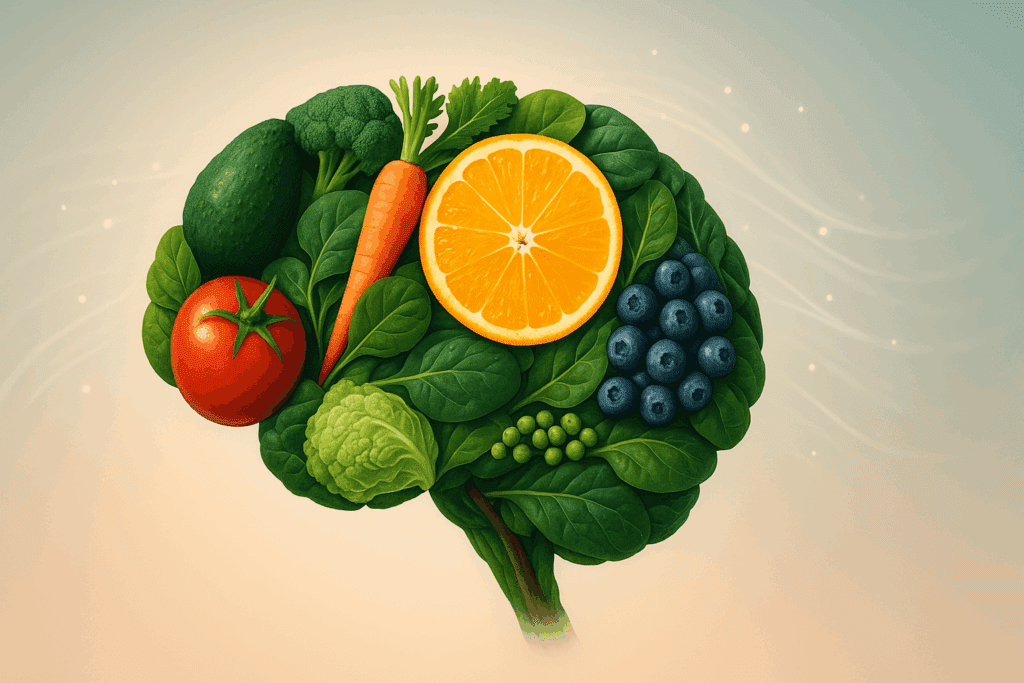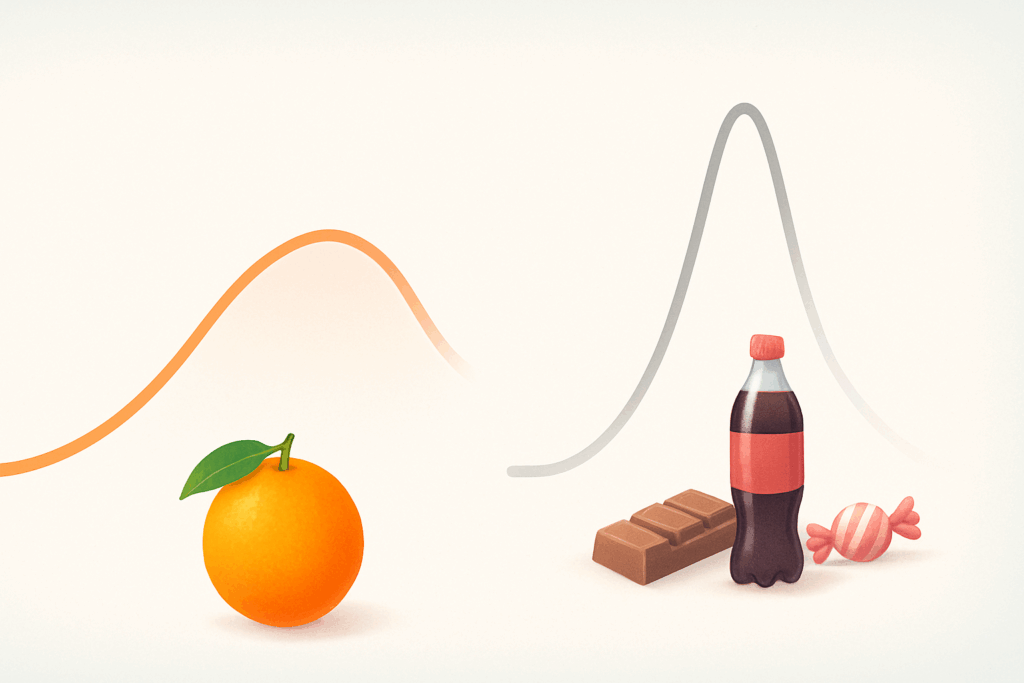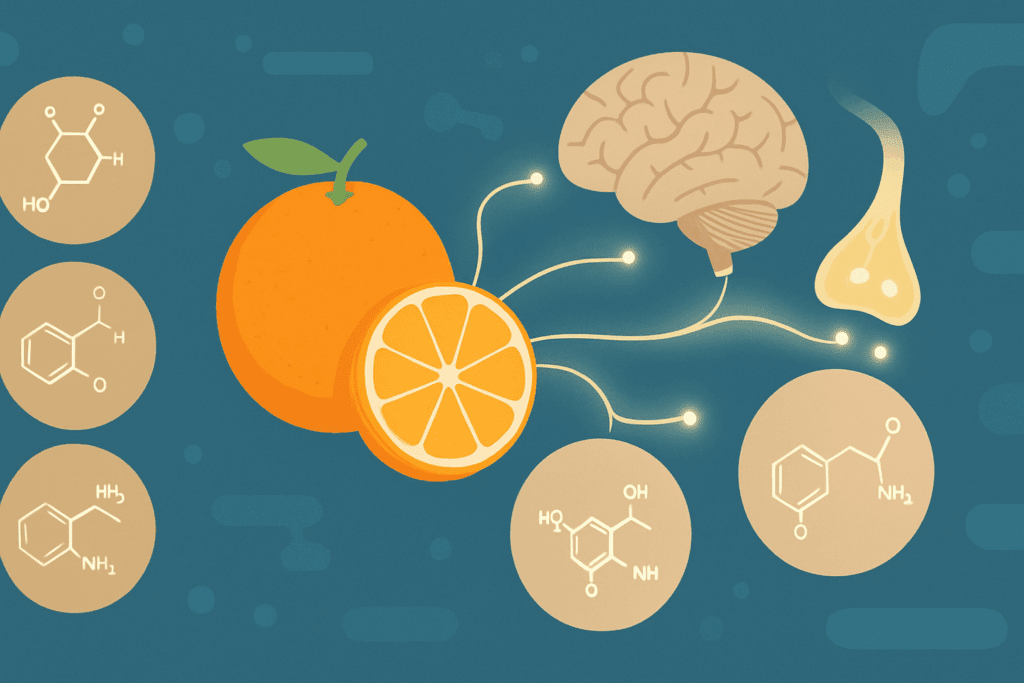In a world increasingly dominated by high-stress environments and mental fatigue, the search for natural ways to boost mood and sustain energy has never been more urgent. Among the many fruits praised for their health benefits, oranges stand out as a surprisingly powerful ally in managing stress and promoting overall emotional well-being. But beyond their reputation as a rich source of vitamin C, do oranges give you energy in a way that can also enhance emotional stability? This article explores the compelling science behind the nutritional profile of oranges, their adaptogenic potential, and how they contribute to stress relief and balanced energy levels, all while aligning with dietary strategies for mental clarity and resilience.
You may also like: Unlock Powerful Stress-Relief with Adaptogenic Mushrooms and Stamina Herbal Support

Understanding the Relationship Between Nutrition and Mental Health
The connection between what we eat and how we feel is no longer a fringe idea but a growing field of scientific inquiry known as nutritional psychiatry. Nutrients are not just building blocks for physical health—they are foundational for emotional well-being and cognitive performance. Several vitamins, minerals, and bioactive compounds in fruits and vegetables directly influence neurotransmitter production, hormone regulation, and inflammatory responses—all of which affect mood and mental stamina.
A consistent intake of certain nutrients, such as B-vitamins, magnesium, antioxidants, and essential fatty acids, has been shown to reduce symptoms of anxiety, depression, and chronic fatigue. Given this link, the role of oranges as an accessible and nutrient-dense food deserves closer attention. Not only are oranges packed with essential vitamins and antioxidants, but they also offer a unique combination of sugars, fiber, and phytochemicals that may help modulate stress response pathways in the brain.

The Nutritional Profile of Oranges: More Than Just Vitamin C
While oranges are widely recognized for their high vitamin C content, which plays a critical role in immune support and skin health, they offer much more in terms of nutritional value. Oranges are a robust source of several B-vitamins, including folate (B9) and thiamine (B1), both of which are vital for energy metabolism and neurological function. Folate supports the production of serotonin, a key neurotransmitter that stabilizes mood and promotes a sense of calm. Meanwhile, thiamine is essential for converting glucose into energy, helping the body and brain sustain vitality throughout the day.
Oranges also provide potassium, an electrolyte that helps regulate blood pressure and nerve function. This is especially important in moments of stress, when cortisol levels rise and the cardiovascular system becomes strained. The natural sugars in oranges, primarily fructose and glucose, are accompanied by dietary fiber, which slows absorption and prevents the rapid energy spikes and crashes often associated with refined carbohydrates. As a result, oranges offer a more balanced and sustainable energy boost compared to processed snacks.

Do Oranges Give You Energy and Support Mental Clarity?
When considering the question, do oranges give you energy, the answer lies in the synergy between their nutrient content and their effect on the body’s metabolic processes. The carbohydrates in oranges are metabolized into glucose, which fuels brain activity and physical movement. However, unlike sugary drinks or energy bars, oranges offer this fuel in a format that also includes fiber, vitamins, and hydrating water content—creating a holistic energy source that doesn’t overwhelm the system.
Furthermore, vitamin C plays a vital role in the synthesis of norepinephrine, a neurotransmitter involved in focus and alertness. Combined with thiamine and other B-vitamins, oranges support the complex web of chemical reactions that convert food into usable energy, particularly for the brain. This makes them an excellent snack for those experiencing mental fog or low motivation due to stress. In fact, regular consumption of oranges can help sharpen cognitive performance and enhance emotional resilience by supplying the nutrients required for optimal brain function.
Does Oranges Give You Energy for Stressful Days? Addressing the Common Misconception
The phrase does oranges give you energy may sound awkward in structure, but it reflects a common curiosity about the fruit’s impact on stamina and mental stamina. While caffeine-containing products are often turned to for a quick jolt, oranges offer a gentler, more sustainable form of revitalization. The energy boost from oranges does not come from stimulation but from replenishment—restoring essential nutrients that are often depleted during times of chronic stress or poor diet.
Scientific studies have shown that stress accelerates the breakdown of vitamin C, magnesium, and B-vitamins, all of which are present in oranges. Consuming oranges can help replenish these nutrients, thereby supporting adrenal function, hormone regulation, and nervous system balance. Unlike stimulants that temporarily mask fatigue, oranges contribute to the biological systems responsible for long-term energy production and emotional equilibrium.

The Adaptogenic Potential of Oranges in Supporting Stress Resilience
Adaptogens are natural substances that help the body adapt to stress and maintain physiological balance. While oranges are not traditionally classified as adaptogens like ashwagandha or reishi mushrooms, their composition suggests they function in a similar capacity. The consistent intake of vitamin C has been shown to modulate the stress response by influencing cortisol levels and supporting adrenal gland function. Additionally, the presence of flavonoids such as hesperidin and naringenin in oranges exerts anti-inflammatory and neuroprotective effects that can buffer the brain against the damaging effects of chronic stress.
These flavonoids are powerful antioxidants that reduce oxidative stress in neural tissue, which is a known contributor to anxiety and depression. Their ability to cross the blood-brain barrier and influence neuronal signaling suggests that they play a subtle but significant role in maintaining mood stability. Thus, while not officially categorized as adaptogens, oranges exhibit properties that align with the goals of adaptogenic nutrition: resilience, equilibrium, and enhanced capacity to handle stress.

Do Oranges Give You Energy Without the Crash? The Science of Glycemic Balance
One of the key advantages of oranges over other energy-boosting options lies in their glycemic profile. Foods with a high glycemic index (GI) can lead to rapid increases in blood sugar, followed by steep declines that trigger fatigue, irritability, and cravings. Oranges, despite their natural sugar content, have a relatively low to moderate GI thanks to their fiber and polyphenol content. This means they release energy more slowly, helping to stabilize blood sugar and sustain energy levels over time.
The fiber in oranges, especially soluble pectin, also contributes to satiety and slows gastric emptying. This not only helps maintain consistent energy but also reduces the likelihood of overeating due to stress or emotional imbalances. For individuals managing mood fluctuations or energy dips related to blood sugar instability, oranges offer a convenient and nutritionally robust snack that can restore balance without overstimulating the nervous system.

Neurotransmitter Synthesis and the Mood-Enhancing Role of Oranges
Beyond their contribution to energy metabolism, oranges play an important role in neurotransmitter synthesis, which directly affects emotional states. Vitamin C is crucial in the biosynthesis of dopamine, a neurotransmitter that governs motivation, pleasure, and reward pathways. A deficiency in dopamine is often associated with low mood, fatigue, and an inability to concentrate—all of which can be exacerbated by stress.
Moreover, folate in oranges is essential for the conversion of homocysteine into methionine, which supports the methylation cycle—a biochemical process integral to serotonin production. Serotonin, often called the “happiness chemical,” plays a pivotal role in regulating mood, appetite, and sleep. By supporting both dopamine and serotonin pathways, oranges help establish a neurochemical environment conducive to emotional balance and cognitive clarity.
Does Oranges Give You Energy for Exercise and Physical Resilience?
Physical activity is a proven method for managing stress and improving mood, and the nutritional profile of oranges makes them a valuable pre-workout or post-workout snack. The simple sugars provide immediate fuel for muscles, while potassium supports proper hydration and muscle contraction. After intense physical exertion, the antioxidants and anti-inflammatory compounds in oranges assist in recovery by reducing muscle soreness and oxidative damage.
Consuming oranges before a workout ensures a steady release of energy that can prevent fatigue during exercise. Post-workout, they can replenish glycogen stores and restore electrolytes lost through sweat, particularly when paired with protein for muscle repair. For those incorporating exercise into their stress-relief regimen, oranges offer a nutrient-dense option that supports both performance and recovery.
The Hydration Factor: How Oranges Combat Stress-Induced Dehydration
Stress has a dehydrating effect on the body, increasing the loss of fluids and essential minerals through sweat and urination. Dehydration, in turn, can worsen feelings of anxiety, fatigue, and mental fog. Oranges are composed of nearly 87% water, making them a highly hydrating food. This water content, combined with electrolytes like potassium and magnesium, helps maintain fluid balance and prevent the cognitive and emotional symptoms associated with dehydration.
Incorporating oranges into the daily diet can be especially beneficial for individuals who struggle to drink enough water or experience dry mouth and tension headaches due to stress. Their refreshing taste and juicy texture also make them more appealing than plain water, encouraging consistent intake. The hydration benefits of oranges are thus another way they support emotional balance and sustained energy throughout the day.
Do Oranges Give You Energy in Synergy with Adaptogenic Mushrooms?
An emerging area of interest in holistic wellness is the synergistic effect of combining adaptogenic mushrooms with nutrient-rich fruits like oranges. Reishi, lion’s mane, and cordyceps mushrooms are well-documented for their stress-modulating and neuroprotective properties. When consumed alongside oranges, these mushrooms may enhance the bioavailability of certain nutrients and create a more comprehensive stress-relief protocol.
For example, the vitamin C in oranges can increase the absorption of polysaccharides found in reishi mushrooms, amplifying their immunomodulatory effects. Lion’s mane, known for its ability to stimulate nerve growth factor (NGF), may work more efficiently in a nutritionally supported environment that includes flavonoids and antioxidants from oranges. The combination of oranges and adaptogenic mushrooms creates a multidimensional approach to emotional resilience, integrating the immediate nutrient boost of citrus with the long-term balancing effects of medicinal fungi.
Practical Ways to Incorporate Oranges for Daily Stress Relief
Given the versatile nature of oranges, integrating them into a stress-relief routine is both easy and enjoyable. Fresh orange segments make a convenient snack during work breaks or study sessions, offering a natural lift in mood and focus. Freshly squeezed orange juice, when consumed in moderation and without added sugar, serves as a hydrating and energizing beverage. Pairing oranges with protein-rich foods such as Greek yogurt or nuts can further enhance satiety and stabilize energy levels.
For those seeking more culinary variety, oranges can be added to smoothies, salads, and even savory dishes. The zest and juice add brightness to marinades and sauces, while segments can complement leafy greens, avocados, and grains in nutrient-dense bowls. By consistently including oranges in meals and snacks, individuals can harness their stress-relieving and energizing benefits throughout the day.
A Note on Individual Variability and Dietary Considerations
While the benefits of oranges are extensive, it’s important to acknowledge individual differences in dietary needs and sensitivities. Some people may experience acid reflux or digestive discomfort when consuming citrus fruits, particularly in large amounts or on an empty stomach. Individuals with kidney disorders may also need to monitor their potassium intake, including from natural sources like oranges.
Additionally, people with blood sugar management concerns should be mindful of portion sizes and pair oranges with fiber, fat, or protein to minimize glycemic fluctuations. As with any dietary strategy, the key is balance, personalization, and listening to one’s body. For most people, however, oranges remain a safe, accessible, and powerful tool for enhancing emotional balance and energy levels.
Frequently Asked Questions (FAQ)
Do oranges give you energy in the same way caffeine does?
No, oranges do not provide energy in the same way that caffeine does. Caffeine stimulates the central nervous system, creating a rapid and temporary feeling of alertness by blocking adenosine receptors in the brain. Oranges, on the other hand, offer a more gradual and biologically nourishing form of energy. They support mitochondrial energy production through their B-vitamin content, especially thiamine, which is involved in carbohydrate metabolism. Rather than creating a spike in stimulation, oranges help enhance cellular energy processes over time, leading to sustained vitality without the risk of energy crashes or dependency that caffeine often introduces.
Can eating oranges impact long-term mood and mental well-being?
Yes, consistent consumption of oranges can positively influence long-term mood and emotional health. Their high folate content supports methylation cycles involved in neurotransmitter regulation, which is crucial for stable mood. Moreover, vitamin C assists in regulating cortisol levels and supports adrenal gland function, which are both key for maintaining psychological balance during chronic stress. Over time, these nutrients help reduce inflammation in the brain, which has been linked to mood disorders such as depression. Incorporating oranges into a balanced diet may enhance mental resilience, especially when paired with other mood-supportive foods like omega-3-rich fish and adaptogens such as reishi.
Does oranges give you energy suitable for endurance sports or only casual activities?
While oranges are often thought of as casual snacks, they are actually suitable for both casual and endurance activities. The simple carbohydrates found in oranges—mainly glucose and fructose—offer a readily available energy source during physical exertion. Potassium, which is essential for muscle function and electrolyte balance, supports hydration during long bouts of exercise. Additionally, the water content in oranges aids in thermoregulation, which becomes particularly important during long-distance running or cycling. Consuming oranges before or during endurance activities can help maintain stamina and reduce the risk of cramps or fatigue, especially when paired with protein and healthy fats for a more comprehensive performance strategy.
Do oranges give you energy if consumed at night, or could they disrupt sleep?
Oranges can still provide gentle energy in the evening without disrupting sleep, but timing and individual sensitivity should be considered. Unlike stimulants, the energy provided by oranges comes from metabolizable sugars and supportive vitamins, not from arousal of the nervous system. That said, for people who are sensitive to acidity or blood sugar fluctuations, consuming citrus fruits late at night might cause mild discomfort or wakefulness. To avoid potential sleep interference, it’s best to eat oranges earlier in the evening or pair them with calming foods like a handful of almonds. For those who metabolize fruit well at night, oranges can actually help reduce nighttime cortisol and support relaxation due to their vitamin C and magnesium content.
What are the cognitive benefits of eating oranges regularly?
Regular consumption of oranges may enhance cognitive function in several ways. The flavonoids found in oranges, such as hesperidin and naringenin, are known to cross the blood-brain barrier and improve cerebral blood flow, which supports memory and learning. These compounds also modulate signaling pathways involved in neuroplasticity, aiding in the brain’s ability to adapt and grow new neural connections. Oranges also support acetylcholine production through choline precursors, which enhance focus and processing speed. Over time, these effects may reduce age-related cognitive decline, especially when paired with other brain-boosting nutrients like B12 and DHA from dietary sources. Including oranges as part of a brain-healthy diet may contribute to long-term neurological resilience.
How does the psychological impact of scent relate to energy levels from oranges?
The invigorating scent of oranges can have psychological benefits that complement their nutritional effects on energy. Aromatherapy research has shown that citrus scents, particularly orange essential oil, can reduce symptoms of anxiety and elevate mood. These scents activate the olfactory bulb, which is directly connected to the limbic system—an area of the brain responsible for emotions, motivation, and memory. Simply inhaling the aroma of oranges may trigger a release of dopamine and serotonin, leading to a subtle yet immediate lift in energy and mental clarity. Incorporating fresh orange slices or orange-scented products into daily rituals can enhance alertness and mood without consuming the fruit itself, especially in workplace or study environments.
Do oranges give you energy in combination with high-protein or high-fat foods?
Yes, combining oranges with protein or healthy fats can amplify their energizing effects by extending the duration of glucose availability. While oranges provide fast-acting carbohydrates, protein sources like Greek yogurt or nuts slow the digestive process, stabilizing blood sugar levels. Fats such as those found in avocado or chia seeds also delay gastric emptying, ensuring a steady release of energy. This combination can be especially beneficial in the morning or before demanding tasks, offering both quick mental alertness and longer-term satiety. Additionally, pairing oranges with these macronutrients can reduce the glycemic impact, making the combination suitable even for individuals monitoring insulin sensitivity.
Are there specific varieties of oranges that give more energy than others?
Different orange varieties offer slightly different nutritional benefits, though all provide core elements like vitamin C and natural sugars. For instance, blood oranges contain higher levels of anthocyanins, which have stronger anti-inflammatory and antioxidant effects that support mental clarity and physical recovery. Valencia oranges tend to be juicier and slightly higher in natural sugars, making them an ideal option for quick energy replenishment. Navel oranges are rich in fiber, which supports glycemic balance and digestive health. Choosing a variety that aligns with personal health goals—such as improved cognition, better digestion, or faster energy recovery—can help tailor the energizing effects of oranges more precisely.
Does oranges give you energy when combined with adaptogens or supplements?
When combined with adaptogens like ashwagandha, cordyceps, or lion’s mane, oranges may amplify the body’s capacity to handle stress and restore energy. Vitamin C enhances the bioavailability of certain compounds in these adaptogens, improving their absorption and therapeutic impact. For example, oranges can increase the body’s uptake of withanolides in ashwagandha, leading to better modulation of cortisol and adrenal support. Likewise, cordyceps combined with orange juice may offer synergistic effects in improving oxygen utilization and cellular ATP production. The antioxidant synergy created by this combination can reduce fatigue more effectively than either food or supplement alone, especially when integrated into a consistent wellness regimen.
How can I use oranges strategically throughout the day for better stress management?
Strategic timing can enhance the benefits of oranges for energy and stress relief. Starting your morning with an orange or orange smoothie can provide an initial boost of focus and hydration. Midday, oranges serve as a valuable pick-me-up that doesn’t interfere with cortisol’s natural rhythm, unlike coffee. In the late afternoon, pairing an orange with a protein snack can help combat the common energy slump and prevent stress-induced cravings. Even in the evening, small portions of oranges can support calm if integrated with foods rich in magnesium or tryptophan. Using oranges this way throughout the day helps maintain emotional balance and steady energy without relying on artificial stimulants or processed snacks.
Final Reflections: Nourishing the Body and Mind with Nature’s Citrus Medicine
As we circle back to the central inquiry—do oranges give you energy and emotional balance?—it becomes increasingly clear that this vibrant fruit offers more than meets the eye. Oranges are not just a convenient snack or a source of hydration; they are a strategic food that can support the physiological and psychological demands of modern life. From stabilizing blood sugar and replenishing stress-depleted nutrients to enhancing neurotransmitter function and working in harmony with adaptogens, oranges demonstrate a profound ability to nourish both body and mind.
Incorporating oranges into a comprehensive approach to stress management offers a gentle yet powerful way to cultivate resilience. Their mood-enhancing nutrients, hydrating properties, and adaptogenic synergy make them an ideal companion in the pursuit of calm, clarity, and sustainable vitality. Whether consumed alone or in combination with other stress-supportive foods, oranges remind us that nature often holds the most effective answers to our wellness challenges—provided we take the time to understand and embrace their full potential.
Further Reading:
Oranges’ Role in Energy Boosting
7 Best Fruits You Should Eat for More Energy, Recommended by a Dietitian
